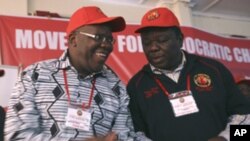The Movement for Democratic Change formation of Zimbabwean Prime Minister Morgan Tsvangirai on Friday formally endorsed the new draft constitution saying it will no longer engage in any negotiations to amend the document.
On the other hand, Zanu PF insists that the party is still to make a final decision on many contentious issues in the draft.
The party's secretary-general, Tendai Biti, told a news conference at the MDC Harvest House headquarters that the national council of his formation approved proposals by its national executive committee to endorse the draft constitution.
Biti said although the party has its reservations on some of the provisions of the proposed governing charter, the draft in its current state is the only workable document.
He said there will be no further negotiations on the draft document as allowing Zanu PF to make amendments could affect the ruling parties’ balance of power.
“The respective party negotiators have adopted an objective give and take document. Each party did not like some of its provisions but they reached a compromise,” Biti said.
The MDC formation of Industry Minister, professor Welshman Ncube also resolved Wednesday to campaign for a “yes” vote adding that it was no longer willing to re-open any negotiations.
Meanwhile, Zanu PF is yet to come up with a position as the party’s politburo meeting held in Harare on Wednesday was reportedly deadlocked on most issues contained in the draft.
Constitutional parliamentary committee co-chairman Douglas Mwonzora of the MDC formation of Mr. Tsvangirai said the management committee is expected to meet Monday to plan for the proposed all-stakeholders’ conference.
Zanu PF spokesman Rugare Gumbo told VOA his party will further discuss provisions of the draft constitution next Wednesday.
“What we decided to interrogate and what we decided to change will all come out on Wednesday,” Gumbo said.
Sources say some Zanu PF officials are not happy that the powers of the president have been clipped in the draft constitution as a president will now be required to consult parliament and cabinet before making key decisions such as declaring a state of emergency or engaging in a war.




